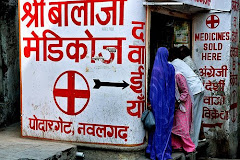- by Dr. Pradeep Ninan (pjninan@gmail.com)
------------------------------------------------------------
What is a Mission Hospital?
These days, it has become politically incorrect to ask such
questions! The fashionable response these days is to say that a mission
hospital is any hospital in which a Christian doctor works. And, indeed, there is a lot of truth in that
statement.
A Christian doctor can work in any place God has called him
to. If he is in the centre of God’s will for his life, and accomplishing the
mission that God has given him, he will be a God-ambassador, and a missionary
in the sphere in which God has placed him.
Today, however, I am asking a different question. What happens
when an entire hospital wants to be a mission hospital? Does God have a mission
for a hospital? Is there a God-mission
in which an entire hospital can participate?
Over the years, it has been my privilege to work (for varying
lengths of time) in about 10 such “mission hospitals” scattered over 5 states
in North and North East India. In addition, I have visited, I think, at least
another 10 mission hospitals scattered over North and South India.
You could say that mission hospitals have always held a
fascination for me, especially as I have watched, studied and learnt from the
way they function, and reflected about the purposes they accomplish in various
parts of India.
Recently, I have been thinking again about the question, “What
is a Mission Hospital?” I have dusted
off an old PowerPoint presentation I made in 2007, and re-written it as a blog
post. I find that writing often helps me clarify and focus my own thoughts and
opinions. This is a work in progress as I seek clarity and personal direction. Please
feel free to comment and respond. As we discuss, perhaps, more clarity may
emerge
I think this may be part of a series of mission-hospital
related posts to come....let’s see how long the creative juices keep flowing!
All that is gold does
not glitter,
Not all those who wander
are lost;
The old that is strong
does not wither,
Deep roots are not
reached by the frost.
(Bilbo Baggins in The
Lord Of The Rings by JRR Tolkien)
What Is a Mission Hospital?
A hospital that claims to be a mission hospital is making a
very powerful statement: It acknowledges that God has a plan for a region, and
claims to be a part of God’s mission and to be collectively trying to
accomplish God’s purposes in its region.
That is HUGE!
As I see it, God might have
three purposes for a Mission Hospital. He would want it to:
1. Seek His Kingdom Mt 6:33
2. Serve the poor and
marginalized Is 58:5-7, Is 1:17, James 2:1-9, 15-16, Job 34:19, Luke 3:11
3. Glorify His Name by running on the basis of principles put
forward in His Word 1 Cor 10:31, Col 1:10, 1 Pet 4:10-11
Understanding God’s purposes is crucial if we are to fulfil
them.
"I
don’t much care where--" said Alice.
"Then
it doesn’t matter which way you go," said the Cat.
"--so
long as I get SOMEWHERE," Alice added as an explanation.
"Oh,
you’re sure to do that," said the Cat, "if you only walk long
enough."
(Alice's
Adventures in Wonderland by Lewis Carroll, Chapter 6)
1. A Mission Hospital must be Seeking God’s
Kingdom. (“Thy Kingdom come, Thy
Will be done on earth as it is in Heaven”)
This means that a mission
hospital would not just be finding its vocation and purpose in treating the
sick and working on the prevention of sickness. The focus of the hospital would
be on seeking God’s kingdom.
The hospital would support and
participate in the extension of God’s Kingdom, not just through evangelism, outreach
and discipleship, but, equally importantly, through promoting Kingdom values
like, for example, social justice and equality (across the sexes, castes,
economic statuses). For example, a mission hospital would actively work against
bonded labour and slavery, exploitation of the poor and the ‘lower castes’ and
tribals and women. A mission hospital would speak up for those who do not have
a voice. A mission hospital would get involved in these issues, because it has
a higher definition of “Wholistic Health”.
Some mission hospitals may,
additionally, also have a specialised role in a specific area. For example, a
training institution seeking to be a mission hospital would seek to establish
God’s kingdom by advocating in its spheres of influence (and passing on to its
students) Christian values and paradigms of compassionate, ethical and
competent care.
2. A Mission Hospital must seek especially
to serve the poor and marginalized. (“Let the oppressed go free”)
The priorities of a mission hospital would be radically
different from the usual priorities in planning Health Care.
In a mission hospital, policy decisions would always be taken
with the poor in mind. This is because God seems to have a preferential option
for the poor.
The rich and poor would both be treated with dignity and get
the same quality of care –the same amount of time in the OPD, same attention,
respect, explanations, and reassurances. No patient would be sent away because
of financial reasons. Treatment protocols would be poor friendly; diagnosis would
be based on history and clinical examination, avoiding unnecessary
investigations, and unnecessary and unnecessarily expensive drugs. Pharmacies would
be poor friendly, stocking low cost, generic medicines rather than expensive
brands. Specific strategies to help the poor may vary from hospital to
hospital, but it would be clear to all looking on that the poor are the focus
of the hospital.
Since there are so few serving
the poor, a mission hospital would not be threatened by nursing homes,
corporate hospitals and medical colleges. Its target population and priorities
are very different!
3. A Mission Hospital would seek to glorify
His Name by running on the basis of principles put forward in His Word.
(“That in all things God may be glorified”)
For example, the finances of a mission
hospital would be clean and transparent. There would be ethical policies in
place regarding, for example, cuts, bribes, referrals, private practice, etc
The hospital would work on the paradigm that Christian
employees of the hospital are also equal members together of Christ’s body, the
Church! All levels of staff would be encouraged, as fellow-children of the
Father, and fellow-heirs of the promise, to share in the vision and participate
in the mission of the hospital. Hospital policies would promote this equality
among the staff. For example, all staff would be free to express opinions,
communicate with the administration and have fellowship together with them. The
hospital would function as a team, and not as a one-man show.
The hospital and staff would be actively involved with the
local church. There would be a clear understanding that the hospital is only a
part of God’s body, fulfilling only a part of God’s mission in a place.
The leadership of the hospital would be in the hands of
servant-leaders who are genuinely fired-up with a passion for seeing God’s
Kingdom come, and have a genuine care and concern for the ones under them. They
would continuously ask their target population and staff members, “How may we
serve you better?”
Wow! Does this sound really idealistic and unrealistic?! Is it
possible to run such a hospital in this day and age?
Let me venture to speculate on ways in which hospitals that
start off with noble intentions to be mission hospitals lose their way.
Mission hospitals lose their way
1. When
the emphasis shifts from seeking God’s purposes for the hospital to following man’s
ideas.
2. When
the hospital begins to imitate others, rationalising bad decisions saying,
‘Everybody does this!’, instead of finding God’s will, and leading the way.
3. When
the emphasis becomes survival and the hospital spends its energy reacting to
the urgent needs that keep popping up. (‘We need to “somehow keep this hospital
running”’)
4. When
the emphasis becomes “Healing” instead of “Seeking God’s Kingdom”
5. When
the emphasis shifts from serving the poor.
Let me suggest what might happen
when a hospital begins to really seek to be a “Mission Hospital”
Matthew 6 : 33 (paraphrased for the mission hospital)
When a mission hospital seeks to
fulfil God’s purpose for it, and begins to seek God’s Kingdom first, it will be
flooded with poor patients in the OPDs. Wards will be full and staffed with
committed people, and the community it serves will be transformed. Every
resource it needs to serve God’s purposes will be added on.
Luke 6 :38 (paraphrased for the mission hospital)
As it gives to the poor, it will receive all that it needs:
good measure, pressed down, shaken together and running over.
Let’s keep talking......
















